Text
Crushing craniums with Pat O’Brien of Cannibal Corpse
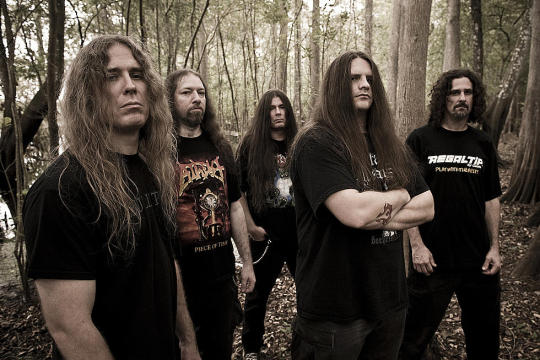
Editor’s note: Interview conducted in 2012 … obviously way before the craziness.
CANNIBAL CORPSE… the band, the myth, the legend. After 24 years on the Death Metal scene and after 12 albums, there’s little new ground to cover when it comes to writing an introduction for this ground-breaking band. Fresh off the release of “Torture”, guitarist Pat O'Brien spoke with Phillip Lawless about the recording process, MORBID ANGEL's last album and O'Brien's brief stint as a replacement guitarist in SLAYER.
Phillip Lawless: The new album just came out, and it seems to be a little more aggressive, if that’s possible. Tell us a little bit about how you guys put it together.
Pat O’Brien: It just pretty much just came together. We got together like we normally did at the end of the tour. We started writing; you know for the album … I mean writing tunes for the album. I don’t know, it just came together. We made it kind of a point for everybody to get more involved in the writing process. So maybe that has something to do why it might sound a little different. I wrote a few more songs, and Rob wrote more songs, so it kind of added something I think to the album. Other than that, it just … I don’t know, just a different time period for CANNIBAL CORPSE I think.
PL: It’s obviously challenging music. How long do you guys normally rehearse before you head into the recording studio?
PO: Usually, it’s about like six months to write the album. That’s usually about the time frame. This time it got pushed back a little bit, it got a little bit delayed. So we had a little more time. But yeah, usually it’s like about six months.
PL: You worked with Erik Rutan again for “Torture”. He’s produced some amazing releases with you guys and for other bands. Why did you decide to work with him again?
PO: Yeah, he’d done such great work for us before; there was just no reason to go to anybody else different. We went out to a different studio this time, did the first half out at his place out Tornillo just outside of El Paso. And it’s called Sonic Ranch Studios. We went out there. We added different elements into the recording process, and it just made sense to use them. You know, we’re just used to the way he works, and, you know, he’s really good at what he does.
PL: Why did you guys decide to record in Texas? What was the motivation?
PO: We just basically did it for something new. It was something different. Just because we could, you know. It was kind of a little bit of a break to get out of Florida. Because we’ve already done the last previous albums in Erik’s place. And it was just the idea of being able to wake up there at the studio and being able to walk there and be right there. You know, it’s just something about that that’s very appealing to me. Having to get in your car and drive for 45 minutes to get down and start recording, you know. So it was just … plus we had done already a few albums out there already. We had done “Wretched Spawn”, “Bloodthirst” and “Gore Obsessed”. We already did like three albums out there in Texas before. So we were, you know, quite familiar with the place. And, you know, we just wanted to go back.
PL: It seems weird to me, Tampa, FL, is such a gorgeous place with beautiful women, yet there’s all these Brutal Death Metal bands from the city. What do you think it is about the city that kind of spawned that scene? Is there something we don’t know about?
PO: It’s probably called the Florida heat. That’s about the only way I can describe it, you know, it gets hot down here in the summer.
PL: Were the guys in the CANNIBAL CORPSE camp aware of the response to the new MORBID ANGEL album?
PO: Uh, yeah.
PL: Is that type of response something you worry about, or do you just write for yourselves and record for yourselves?
PO: Well, you know, I mean you’ve always got to be I guess … we always have to kind of be a little on guard for something like that. To where we put out our new album and we think it’s one of our best. And if for some reason, you know, it’s not. For some reason, no one likes it or whatever. But I think we pretty much stayed true to what we do, you know, we didn’t really stray away from being CANNIBAL CORPSE. You know, I think MORBID ANGEL, I think they went a little out there on trying some different kind of things. Which I don’t really mind if a band does that, but I think they should have taken … I think they should have maybe saved songs that they put on their new album maybe and done a side project and just did a whole different band or something. With different kind of songs like that.
PL: So no techno on CANNIBAL CORPSE albums?
PO: No, no. No, I mean that’s what you’re going to get. You’re going to get a CANNIBAL CORPSE album. There’s going to be a few little surprises here and there, but, you know, it’s like if you go buy an AC/DC album, you’re going to expect to hear AC/DC. You know, you don’t want to go buy an AC/DC album and all of the sudden it sounds like RUSH. Cause that’s not AC/DC anymore.
PL: I had forgotten until I was doing some research, but you filled in on guitar for SLAYER for a few dates. I wanted to get your impressions. How was that for you?
PO: Oh, that was intense. That was hard, actually. I didn’t have very much time to learn the songs, so I had to really bust my ass, shall I say. And I had like a week and a half to learn all the songs. It was intense. It was a very surreal situation. Yeah, it was cool though.
PL: Were the dates larger festivals or smaller festivals in Europe? What types of shows were you playing?
PO: It was like a, some of it was like arenas and some of it was like really big clubs. Yeah, it was SLAYER and MEGADETH, actually.
PL: In the time you’ve been in CANNIBAL CORPSE, have your label, Metal Blade Records, ever stepped in over artwork or lyrics and said, “Whoa, you guys are maybe taking this too far.” Or have they always been in your corner?
PO: They’ve always been in our corner, pretty much. I mean they’ll make suggestions, you know, like putting a sleeve maybe over the top of some of the graphic work, but then still leaving the good artwork in there. Just so they can get it in the stores, because they’ve had problems in the past like getting some of our album covers like in let’s say one place like Best Buy for example. So we’ve had to have some censored artwork. But it’s not been a big deal. They’ve pretty much been in our corner the whole time. They know what we’re about.
PL: When it comes to album artwork, do you guys choose from multiple pieces of art, or is the artwork created specifically based on CANNIBAL CORPSE’s ideas?
PO: Well, we have the same artist; he’s been doing the album covers since day one. His name’s Vince Locke. And what happens is he’ll come up with a rough sketch, and then we’ll maybe throw some suggestions here and there. Then he’ll go forward with the sketch. And it kind of just goes further and further until we’ve pretty much got what we want. Then he actually makes the actual painting.
PL: You guys have a big tour with EXHUMED and some other bands coming up. Tell us a little about it.
PO: We’re going to go do the major markets with the “Summer Slaughter”.
PL: What’s the typical day on the road like for CANNIBAL CORPSE? Is it more low key, or is it horror movies and Heavy Metal all day?
PO: I’d say it’s pretty much low key. Yeah, I’d say pretty much. Our singer, I don’t know, he likes to stay up and drink all night and listen to Hank III. That’s his new thing, drinking Jack Daniels and listening to Hank III. But other than that, it’s pretty mellow.
PL: Going back to your earlier band, were you in MONSTROSITY at the same time as George?
PO: I was actually in MONSTROSITY after George had joined (CANNIBAL CORPSE) for the “Vile” album. I came in and did a tour when they had just put out the “Millenium” album with George’s vocals on it. George left to join CANNIBAL CORPSE I think right before that album came out or something.
PL: How do European audiences respond to American death metal, and how are they different than U.S. audiences?
PO: Um, it seems to be really close to the same at this point. Yeah, I don’t really see that big of a difference. I mean, the European fans are very dedicated though, you know, very dedicated. There’s a lot of dedicated metal fans in Europe. But, you know, there’s a lot of them in the States too. It’s about the same, it really is.
PL: Are you all headed to Europe for some bigger festivals this summer? What’s the biggest one looking like for CANNIBAL CORPSE?
PO: I think we’re playing … I’m not real sure honestly. I think we might be playing Grasspop, but I’m not sure. That might be the biggest one. I still haven’t even; honestly, I haven’t even looked at all the dates. But we’re doing Hellfest, I know that’s a big one we’re going to be doing. We were supposed to be doing some of them with the original BLACK SABBATHlineup. But then Tony Iommi came down with his cancer, so it’s going to be like OZZY and friends, I guess. The original BLACK SABBATH, I’m kind of a little bummed about that because I was … well, I’m a guitar player and Tony Iommi is probably one of my favorite all-time heroes of guitar so.
PL: Thinking back over your time with CANNIBAL CORPSE, what’s the strangest gig you’ve ever played with them? Where have you been on stage and thought, “What the hell is going on?”
PO: Well, it was actually probably with SLAYER. I standing up there, I’m looking over and there’s, you know, Tom Araya and then Kerry King. I’m looking over there, and I’m like, “What the fuck? What the hell am I doing up here?” You know, looking back there and seeing Lombardo. And it was just … wow, that was just weird. That was the weirdest for me. Because it all went down so fast, I was like, “What the hell am I doing up here?”
PL: Did it make it hard to enjoy playing with SLAYER?
PO: Well, it was just … there was just so much to learn and so much stress that there really wasn’t time to really … there wasn’t really time to, time to enjoy it. See, I had to just focus on doing the job, you know. But that was probably the weirdest for me. You know, as far as a CANNIBAL gig goes, the weirdest CANNIBAL gig we’ve ever done, I don’t know. I’d have to think about that one. There’s so many of them.
2 notes
·
View notes
Text
GOATWHORE Gather Blood for the Master
Editor’s note: Another blastbeat from the past. A 2012 interview with GOATWHORE bassist James Harvey.This one is unique because it’s an email interview that actually turned out to be decent. The editor of the site I was writing for at the time said he had an email interview lined up and asked me to send him a set of questions for GOATWHORE. I don’t even think I knew what member was going to answer when I wrote the questions. (Oh yeah, and I’m actually going to edit it for this posting.) GOATWHORE RIP! LISTEN TO MORE GOATWHORE!!!
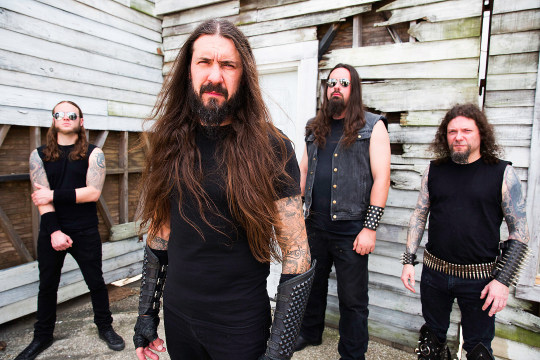
Recently GOATWHORE came out with their new album on Metal Blade Records, “Blood For The Master.” Phillip Lawless talked to bass player James Harvey about the new album and his time with the New Orleans band.
Phillip Lawless: Hi, James. Thanks for taking time out to speak to Metal-Temple.com. “Blood for the Master” will be out soon, and it’s a killer. Tell us a little about the writing process for the new album.
James Harvey: Well, the writing process was pretty simple … coming up with riffs and jamming on them, creating songs. Other elements like guitar solos, intros, etc., come in later, after the songs are pretty much complete. Nothing really too out of the ordinary.
PL: Who brought in material? Did you guys work on any songs as a band?
JH: Yeah, most of the stuff we worked on as a band – we would get together and jam pretty much every night and work on stuff. Sammy would usually bring riffs in, he and I might tweak them some, and then we would start to assemble parts into songs, etc. If I was out of town, Sammy and Zack would usually get together and work on stuff as well. Once the basic skeletons are there it is easy to customize drum parts, bass parts, guitar solos, etc.
PL: Which songs do you think will be your favorites to play in a live setting?
JH: So far we have chosen a few new songs to play live. “In Deathless Tradition” and “An End to Nothing” have been really cool to play live. In the future we will work in more stuff, including “Death to the Architects of Heaven,” which should be a fun one to play.
What was it like working with Erik Rutan in the studio? How did he contribute to “Blood for the Master”?
JH: It was great to work with Rutan – he has an awesome studio and really knows what he is doing. He drives us to get the best performances possible and has a good ear for detail. Erik provides input and feedback for the overall sound of things as well as getting good instrument sounds, etc. He also provides input regarding more detailed things in songs, such as a certain guitar solo or bass line, or vocal pattern, etc. If it doesn’t sound quite right, he will let us know, and it is helpful to have a fifth person outside of the band to contribute an opinion.
PL: The new album cover is pretty sinister. Where did the album artwork originate?
JH: Our friend Jordan Barlow did the artwork – he is a very talented tattoo artist in New Orleans. Ben reviewed ideas with us, they talked about what it should look like, and he drew it up. All the artwork came out killer. If you are ever in New Orleans, stop by Jordan’s shop – “Hell of High Water Tattoos” – and get some ink! He is one of my best friends and is a great artist.
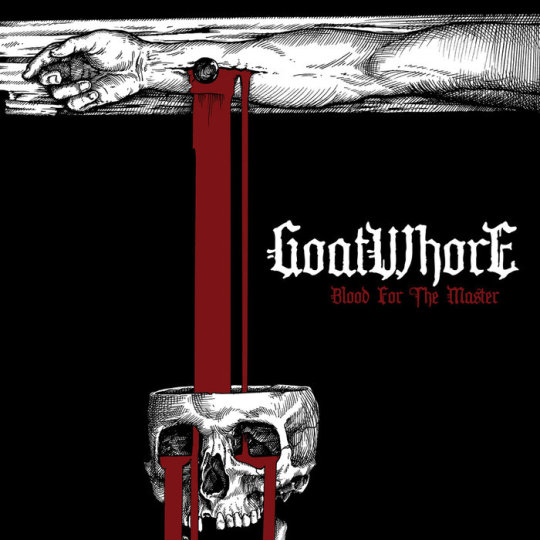
PL: Whose idea was it to unleash the album on Valentine’s Day?
JH: Actually it was a coincidence. It just ended up that way with Metal Blade’s release schedule. It worked out quite well though.
PL: How is the band’s relationship with Metal Blade Records? Is it a good situation for GOATWHORE?
JH: Well, I have to say Metal Blade definitely stepped it up with this album. They did the pre-order bundles, vinyl, etc., as well as advertised. We were pleasantly surprised. This new release is a good situation for GOATWHORE and Metal Blade.
PL: You are the newest member of GOATWHORE, having joined in 2009. Take us back a couple years. How did you land the bass player position in the band?
JH: Well, I had been jamming with Sammy for a few years beforehand in RITUAL KILLER, so I already knew him and all the guys from living in New Orleans and going to shows, etc. The timing was perfect as I was just finishing up my Master’s degree when I joined the band. I got the call one day and hit the road shortly after…
PL: Did the other guys put you through a hazing period when you joined?
JH: Of course they did, I think we always still ‘haze’ each other to some extent still, but I get it the worst!
PL: How does living in New Orleans affect the band sound and attitude?
JH: Well, the sound still retains that super thick and heavy sound, even though we do much faster stuff than the traditional ‘New Orleans’ sound that many people associate with EYEHATEGOD and CROWBAR. As far as the attitude goes, it affects us in positive and negative ways – there is more to New Orleans than shrimp po-boys and daiquiris.
PL: Since you’ve joined in 2009, what’s been the strangest show you’ve played with GOATWHORE?
JH: We have definitely played some strange shows before … probably the craziest was a show we did a couple of years back with EYEHATEGOD and PIG DESTROYER – on a boat that went around the Hudson Bay while the show went on. It was packed and was absolutely insane. I couldn’t fully stand up on the ‘stage’ – it was too short!
PL: What are some bands you haven’t toured with that would be a good fit to share the stage with GOATWHORE?
JH: We want to go out opening for SLAYER! As far as other bands to play with – touring with new bands is usually how I am introduced to new music. I don’t really listen to too much new stuff myself. Some bands that we have gone out with and really had a good time with include SKELETONWITCH, BLACK ANVIL, EXHUMED, HAVOK, SAVIORS and TOXIC HOLOCAUST to name a few.
PL: James, thanks a lot for your time but before you go, please tell us about GOATWHORE’s upcoming tour plans.
JH: Well we are out on the road right now with LOCK UP, we will be meeting up with HATE ETERNAL for a two-week run of dates then meeting up with DYING FETUS for a short run. There are plans to go to Europe in the spring/summer and Australia in the summer. Then we will be doing another US tour in the late summer. Stay tuned for details!
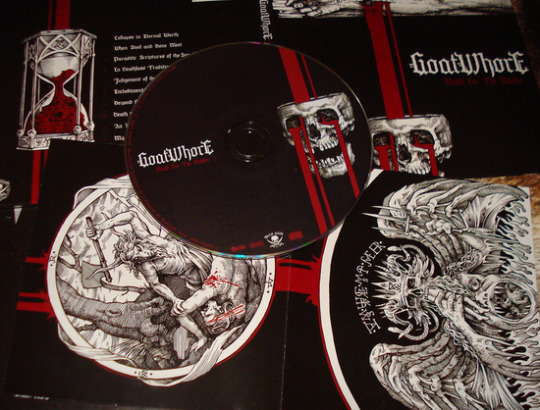
0 notes
Text
C.O.C.: Punk Tours and Hardcore History
Editor’s note: Back in 2012, I was lucky enough to schedule a phone interview with C.O.C.’s Woody Weatherman. The band had reformed as a trio and were on a tour where they played the entirety of the “Animosity” album. I was trying to help publicize the tour’s Birmingham, Ala., stop (the promoter did a horrible job), so I ended up getting this interview on the blog section of al.com. The publicizing part didn’t work, but the interview turned out decent. Included are some photos posted by opening band Zoroaster that were taken at the Birmingham date of the tour.
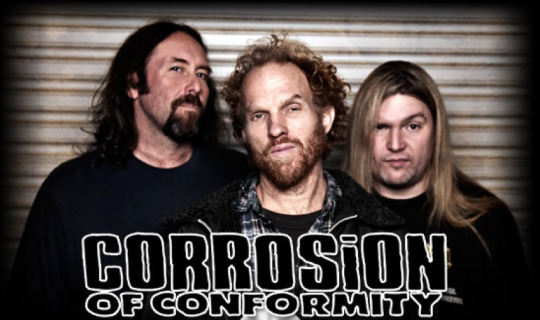
North Carolina’s Corrosion of Conformity … C.O.C. for short … reformed as a trio a few years back. After a tour where they performed the entire crossover classic “Animosity,” the group recorded, and will soon release, a new self-titled album. Phillip Lawless had the opportunity to speak with guitarist Woody Weatherman about the new album, the band’s reformation and C.O.C.’s upcoming tours…
Phillip Lawless: I know the new self-titled album is about to come out. I wanted to ask how the recording sessions went for the album.
Woody Weatherman: Basically, it was definitely one of the easiest trips to the studio that we’ve ever done. I mean we pretty much had our shit together. So we, you know, kind of been playing the songs live for a while … well, most of them, not all of them. Working out the kinks and all that stuff. And by the time we got in the studio, man, it just rolled right on, man. We just … the way we do it in the studio is like Mike and I just kind of get in the room with Reed, get the drums all miced up, have some amps off in another room, slap the headsets on, and we just kind of play like we’re playing live. Let Reed do his thing, man. And that’s basically how we get the drum tracks going. Then we just start stacking stuff up. This time around, man, it really went smooth. No worries.
PL: You said you guys were playing some of the new songs live. How did these songs come together? Did different members bring them in, or did you jam and write together?
WW: A lot of both. Probably 80 percent of it, everybody just showed up and had three or four songs in their head that they wanted to contribute. Some of them were sort of partial songs. Here’s a for instance. I showed up, I had a tune that I wanted to do, but it only had a couple parts. And so I played the parts for Mike, you know, five minutes later he had some other stuff and we just threw it together and started making songs that way, you know. If you can’t come up with the whole thing, you just kind of get together and … we’ve all worked together for so long that we can make stuff like that happen pretty easy.
PL: C.O.C.’s new era is kind of the old era, I guess. What led to you guys getting back together as a three piece and moving on without Pepper Keenan?
WW: A kind of funny part of the story is Pepper was kind of the catalyst for getting us all back together because he had been out on the road with DOWN for a while and sort of noticed that there was some interest in having CORROSION come over and do some festivals in Europe. And so he sort of hit us all up, because Mike and Reed and I live pretty close to each other. We started jamming in anticipation of that, and that really never materialized, you know, due to a few factors. But we just kept on jamming, and the next thing you know we were writing music and playing shows and having a good time. And we just kept on rolling with the ball.
PL: Correct me if I’m wrong, but you’re the only member that’s been on every C.O.C. album.
WW: That’s what they tell me.
PL: Was there a secret to that, or was it just carrying on to carry on?
WW: I guess I just was the only one that just kept on hanging around, you know. I mean, with that being said, man, it’s just awesome to have Reed back in the fold. Especially, you know, after him being gone for like really a whole decade, man, he wasn’t in the band. And that’s really been the catalyst for making all this stuff work, having him back and it just makes the stuff flow so easy, you know, having the three original guys. It’s been a lot of fun.
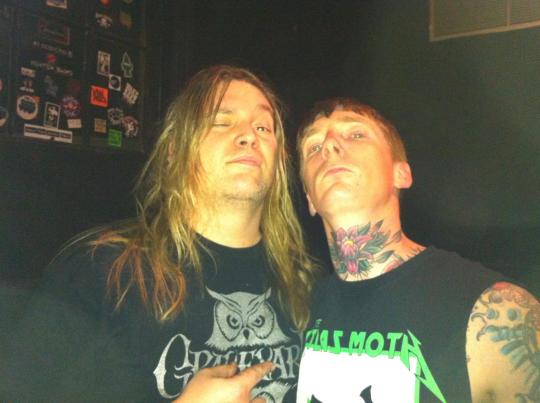
PL: You guys were revisiting the second album, and a little bit of the first, is there anything you remember about recording those early albums? Any cool memories from the early days?
WW: Those things, especially like, yeah you’re talking going all the way back to like “Eye for an Eye” or something like that, I mean we had no idea what going to the studio was. We didn’t, you know, we had no clue. We just were writing these punk rock songs having a good time and wound up, you know, with microphones in front of our amps and trying to capture it. But, you know, we would record that whole damn album like in a day. We’d just set up and just start burning through songs, you know. We had really no clue on what it took to capture, you know, stuff on tape and, you know, that you’re supposed to take a little bit of time or whatever. But, you know, you live and learn. Of course by the time we got around to doing “Animosity,” we did half, side two of that record in Raleigh, NC. We rode out to Los Angeles to do side one. And that was kind of our first foray into a real studio and whatnot. I guess the learning process started then. You know man, it was all good times, you can’t complain.
PL: As young kids, was C.O.C. on any crazy punk tours? Were there any older bands you played with that were noteworthy or interesting?
WW: Oh man, yeah dozens. You know, we were kids ourselves when we first hit the road. I mean, we were playing dives, we were just trading off gigs with, you know, punk rock bands in other towns. It would be like, “Man, well you put us up and let us play your town and we’ll do the same for you if you come our way.” And that was how we kind of traded out and got to tour back then. Because there was like this whole network, and even if you were an unknown band just starting out, I mean you could travel around this sort of hardcore, you know, punk rock network. And that’s the way we did it, man. And just from a very early stage, like whenever we did that “Eye for an Eye” record back in 84 or whatever, we pretty much hit the road right off the bat. I think we did a couple runs that summer, went out west. Yeah, that was just the way that we sort made a name for ourselves was just hitting the road.
PL: Recently, C.O.C. was playing a different style of music, and now you’ve came back playing the whole “Animosity” album. Did you have to work on your speed metal chops again or was it like riding a bike?
WW: It was kind of like riding a bike. But I tell you, some of those tunes, like and the stuff on “Technocracy” and stuff, they’re pretty challenging. I mean there’s a … they’re fast and there’s some crazy changes and lots of parts, you know, stuffed in there. I tell you, it was definitely fun relearning some of them. There were a few that we had played live through the years, thrown in sets at different times, but doing the whole, it’s kind of challenging. Because, yeah, they’re a little faster than some of the stuff we’ve been playing, you know, on the last few records. But man, they’re … that stuff is a blast to play live. We’re having a great time doing it. I mean this upcoming tour we’re keeping a lot of that stuff in the set, and doing a lot of, of course a lot of the new record. And even some, you know we’ve got a couple things off like “Deliverance,” you know, stuff like that we’re tossing in there for fun. So we’ve got a pretty wide variety happening on this tour coming up.
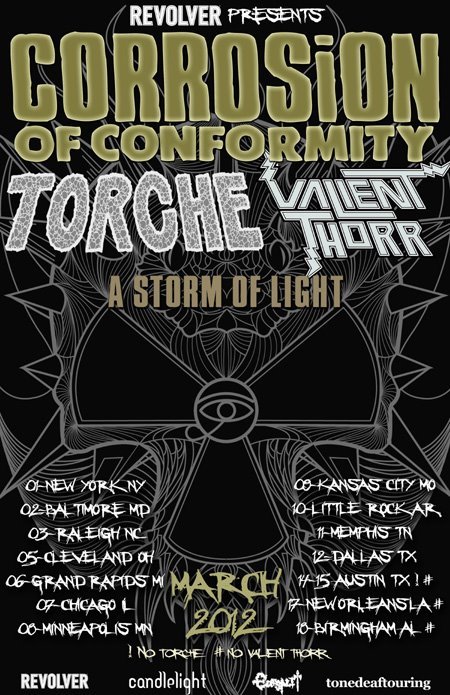
PL: Are you guys still doing a song off “Blind”? It seems like I heard you were playing “Vote with a Bullet.”
WW: Yeah, sometimes we do a little taster of that, you know, just for fun.
PL: Was the “Blind” lineup revamp the band’s decision, or did the record label have something to do with taking the band in that direction?
WW: Nah, no record label stuff. I mean that was just us, you know, doing our thing. There were things at the time and the place, and that was what felt right at the time, you know, throwing that lineup together. And we had a … we made a good record and had fun on the road. It kind of fell apart, that particular lineup, whenever it came time to start working on the “Deliverance” album. It didn’t really work out that way. But we made the changes and made it happen like we always do.
PL: Now, 30 years later, being on the road, how has it changed? Is it a different routine, or does it have a lot in common with the early days?
WW: Hey, we’re still in a van, playing some of the same venues as a matter of fact. There’s still a few venues that are still hanging there, you know, year after year. But, I mean, it’s kind of the same thing, you know. Obviously we used to do crazier stuff when we were younger. We would do, I mean, crazy drives. We would just kind of kill ourselves and not really know it just cause we didn’t care. You know, kids just get out there, “Ah, it’s only 15 hours to the next show. We’ll leave after we play and we’ll get there in time to play.” We used to do a lot of that kind of stuff. You know, we try to take it a little easier on ourselves, driving distances and all that kind of stuff these days. Other than that, man, you know we’re still out there doing it, having fun. So it’s kind of the same thing.
PL: You’re touring with a good number of up-and-coming younger bands. Have any of those bands that have caught your eye? Anybody that you’re impressed with?
WW: Ah man, there always is. Well, this tour coming up I’m really excited about. We’ve got the TORCHE guys; VALIENT THORR, who are another Carolina act, so we’re real stoked about that; and A STORM OF LIGHT, who I’m really excited to see live. I mean we always try to … if it’s our tour, we try to throw something together that’s, you know, pretty cohesive, but not exactly the same thing. Like we don’t want to go out where every band is the same thing over and over. You know, we try to get a little diversity in there, a little variety without it going too far off the deep end. And I think this tour is going to be fun. We’ve got a bunch of other dates that we haven’t announced yet. We’re going to be heading out west and, you know, up into Canada and stuff. So we’ve had a lot of people going, “Man, you never come to Canada anymore!” So we’re getting ready to.
PL: No offense, but the vocals with this lineup have improved tremendously. Was that something you all worked on, or have you all just had more time to mature as vocalists?
WW: Well, you know, Mike of course really brought his A-game to the album. And he did a great job. And Reed sings three songs on the record too, you know. Thankfully, I didn’t sing much. They don’t want me to sing. I just stick to the six strings they allow me to twang on. But yeah man, Mike really stepped up to the plate. He did a great job, and so did Reed. I mean those guys, you know they worked on their stuff and worked on their lyrics and, you know, spent some time on it.
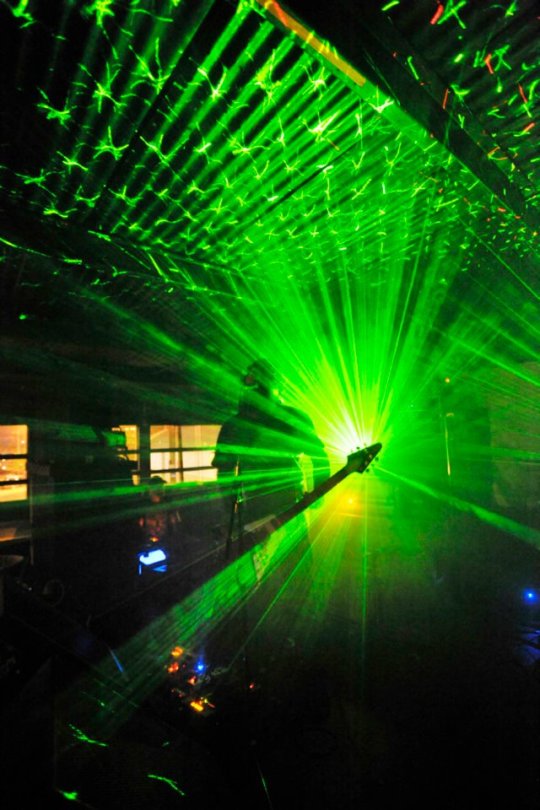
0 notes
Text
23 Minutes Alone with Philip H. Anselmo
By Phillip Lawless
Blackest of the Black, Superjoint’s return, The Melvins, Housecore Horror and more
Phillip Lawless: This tour marks the return of Superjoint. For fans that only know you from your time in Pantera, how would you describe the Superjoint sound and maybe compare it to Pantera?
Philip Anselmo: I can’t, man. I think it’s different. The whole idea with Superjoint was to minimalize lead guitar and whatnot and just really shorten up songs hardcore style. I guess the overall for me, in doing Superjoint, was to get back into smaller rooms because, by the time [Superjoint] started I guess gigging and whatnot, Pantera had made significant strides and we were playing these big, gigantic rooms. When it comes individually to the band Superjoint, for me, it was about getting back into the more intimate rooms. I guess that’s exactly what we did.
PL: What do you remember about the initial formation of Superjoint? How did the band come together?
PA: Back in the day, when I lived in my first house in New Orleans, I was young, wild, free, and my house was a party house, man. Most of the time, musicians would end up at the house and normally ended up passing out at the house. So we’d wake up and the only thing to do would be to work out, start drinking and start jamming. And that would happen with several different cycles of people. Superjoint really started out as a band where Jimmy Bower and I could play guitar together. That was the initial focus. Honestly, I was not supposed to even be the singer in Superjoint. It really just started off as a jam band until we ran out of options and, you know, I picked up the microphone and we added Kevin on guitar. He was playing bass at the time, so he switched back to his original instrument, the guitar, and we went through several bass players. So that’s the truth of it.
PL: You and Jimmy are still the backbone of the new Superjoint lineup. How long have you guys been friends and how did you meet?
PA: Man, I met Jim in about 1987. Really our first bonding experience was, we were out at the local bar...one of many here in New Orleans...and he goes, “Man, come check this out.” So we went and sat in his car and he started playing me this tape, and it was a rough tape with no vocals on it. It was obviously a demo getting tracked. And he put me up for the test. He’s like, “Who is this? Guess who this is.” I kept listening and listening and listening, and I eventually pegged it. It was Exhorder’s Slaughter in the Vatican demos. The 1988 demo. Yeah, man, that’s how we bonded over music and became friends.
PL: That’s a long-term friendship, especially in the music business.
PA: Aw yeah, stronger than ever. Always my brother.
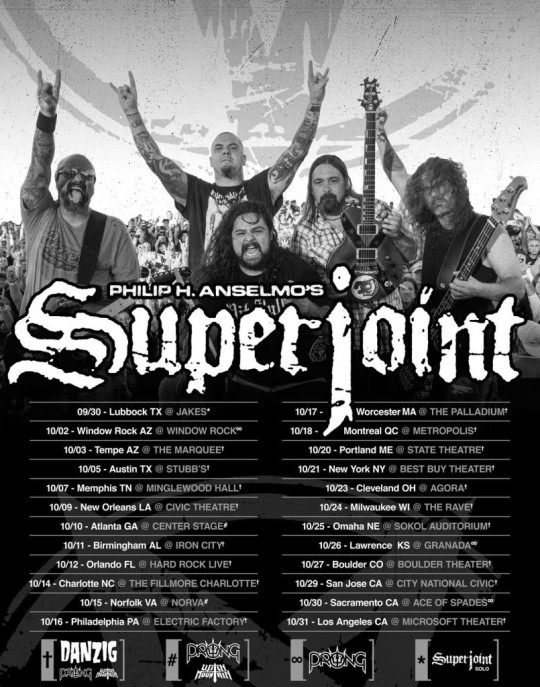
PL: Superjoint is hitting the road with a new lineup. Are there any plans to record new material with this lineup of the band?
PA: Yes. We’ve been working on some new stuff. You know, to be honest with you, it’s parts, and we keep finagling the parts and messing with them. So, as far as anything like even remotely close to what I would say a finished song would be, I don’t think we’re near that. But after this tour I think we’re going to sit down and take a good cold stare at what we have and start building around that. And yes, I would expect some new Superjoint hopefully in 2016.
PL: There’s a stacked lineup on this tour, Superjoint with Danzig, Prong and a great opener in Witch Mountain coming to Iron City in Birmingham. It seems Danzig and Pantera always took younger bands on big tours and helped introduce them to larger audiences. Also, through your record labels you’ve helped new bands. Why has helping young bands always been important for you?
PA: What happens...and it was the case with Pantera, it was veteran bands that helped us out. So, you learn from the best, and in this business...as successful as Pantera was and is...I can’t help myself but to give back and to try and identify with younger bands that are innovators, not imitators necessarily, innovators. Or bands specifically that are ready to go. Bands that are ready to hit the road. Ready to do it the hard way like Pantera did. We ground it out tour to tour to tour before we even saw one penny. So it’s those kinds of bands...lifers I like to call ‘em, that I’m looking for. Like I said, it feels natural to give back to something that’s been so freaking kind to myself and many others.
PL: Have you had much contact with Danzig? Is Glenn someone you’ve met and worked with over the years?
PA: Absolutely, Glenn is a sweetheart. He’s been nothing but a big brother to me since 1990 when I first met him. Always a complete gentleman. Always a supporter. He played my horror fest last year, and I’m figuring him sticking Superjoint on this slot is his way of thanking me back. And I’ve got a great relationship with Glenn.
PL: You mentioned your annual Housecore Horror Festival planned for November in San Antonio, Texas. The lineup of bands is amazing. How hands-on have you been with selecting the bands that have played the Housecore festival?
PA: I’m very much hands on. Whether it’s me reaching out to the bands or the bands reaching out to us. I got to give a lot of credit to Ryan Taylor who books Maryland Death Fest. He did a great job for us this year pulling some bands together. It’s always, “Let’s take a look at what we’ve got...let’s see how many we can fit.” You run into every avenue. You run into, “Oh my God, yes! We scored this band. This is great.” Other times it’s like, “Oh shit, we don’t have room this year, but please be available next year.” It’s always that type of thing. So, you run into all kinds of stuff. But like I said, big credit to Ryan and his team and our team. We’ve got a great team working for us.
And I do need to add that this year is absolutely dedicated to the memory of Corey Mitchell because he was the co-founder of the Housecore Horror Film Festival. He fought harder than anyone...anyone out there...to make this a real thing and something to look forward to every year. And he was always a big dreamer about moving it from city to city. He was talking about moving it to Europe at one point before we even did year one. I’m like, “Corey, slow down. Jesus Christ, you big dreamer, you.” It was that type of enthusiasm that made this shit happen, man. Big props to Corey, his family left behind, and rest in peace, big brother. We are carrying on in his tradition.
PL: Are there movies that have played the festival that you’ve really enjoyed? I was reading about your horror movie collection and wondering if you have any recommendations.
PA: This year for sure we are doing...first and foremost we’ve got Dawn of the Dead and that’s going to be scored live by Claudio Simonetti’s Goblin. I gotta say, year one we had Goblin score Suspiria, and that was one of the most surreal things I’ve ever seen. To see it again, except Dawn of the Dead this year, that’s going to be incredible. Also, we’re definitely giving homage to Bob Clark and Alan Ormsby, the films they made: Children Shouldn’t Play with Dead Things, Deranged, Deathdream. Those are great films, man. Great films from the 70s that maybe a lot of the younger audience doesn’t know about so it will be educational for them as far as what an extreme film is, because they absolutely were extreme, especially in the case of Deranged.
And also, something that I look forward to always is the submissions, from the newer crowd of directors that are the lesser known, newer directors out there that are trying to do something with the horror genre. I always find that very interesting. So sifting through all that stuff is always...it’s telling, it’s educational, it lets you know what’s out there. And I think we picked some good ones this year.
So all that stuff is very worthy to look forward to. And then again, you’ve got the bands playing too, so it’s like pick your poison. If you come for the films, we got that. If you come for the bands, we got that too.
PL: I’d like to ask a little bit of a historical question, I guess. Watching the Noisey series on the metal scene in New Orleans, it seemed like one of the major touch points for the New Orleans scene was always The Melvins. I was wondering how a band from upstate Washington ended up having such a deep and lasting effect on a bunch of wild metalheads in New Orleans.
PA: I think it was timing. I think it was around the time when thrash had worn a bit of its welcome out. Death metal was just blossoming. There were the individuals here that I guess got tired of speed for the sake of speed within music. And out of nowhere came this band called The Melvins that were doing things their own way. And once you grasped what The Melvins were doing...which is very challenging, at the time especially...because not only are they great musicians, but they can fuck with the format of music as well - timing wise and intricacies and all of that, subtleties - the fact that they would drone to a certain degree, or a huge degree, that brought us back even further to the reappreciation of Black Sabbath and bands of that ilk and bands that were influenced by Black Sabbath later like Saint Vitus and Trouble and Witchfinder General, The Obsessed, etc. Truthfully, I think Jimmy Bower, Mike Williams and a handful of other people - Kirk Windstein for damn sure - were really moved heavily by The Melvins, and they were the guys that sent me home with a tape of Gluey Porch Treatments and Ozma, The Melvins’ first two records. Yeah, man, that was absolutely a 100 percent game changer right there. So it is interesting...it’s interesting how that happened.
You can see it, you can feel it, when Jimmy Bower plays drums people can cite John Bonham or Bill Ward type beats, but really it’s Dale Crover that he’s really emulating to a certain degree. It’s the strike on the kit itself...it’s the velocity with which one hits the drums. Dale beats the hell out of those drums, man, and with a passion. With what we like to call, he plays behind the beat, so to speak. There’s a drag there that is essential to the slow groove and I think that resonated throughout the New Orleans scene, and here we are today in 2015 still talking about it. That’s a big resonation.
PL: Especially for them to be three kids from Washington. It’s just crazy to follow their career arc.
PA: Very much so. And talk about a group of awesome guys. Just really super guys. Great to tour with...funny, hilarious, nice, easy to be with, down to earth, you name it, The Melvins, they got it all, man. Awesome group.
PL: One my favorite live videos of The Melvins, it’s their four-member lineup, and you can see a crowd of guys from other bands on the side stage during a festival in Europe. You can see Jimmy Bower and you just rocking out the entire time.
PA: Yeah, Cody and them. I know exactly what you’re talking about. Because that day, I had seen so many bands play...Morbid Angel, I saw so many bands that were awesome. And somehow The Melvins came out there out of nowhere with a completely different style…and blew everyone’s ass away. I mean smoked everybody. And we were just stunned, amazed and gasping for air. It was like, “Whoa. This is the real deal.” I’ll go on record and say, of this generation...I guess this is more of a statement/question...but who’s done more for rock music than The Melvins? I’m not sure anyone has.
PL: I was lucky enough to see Superjoint in 2004 as part of the Ozzfest. That day you came out on the main stage and your stage banter just killed. You had mothers turning purple, you had serious metal fans laughing their asses off. I just wonder if your stage bits are things you’ve worked on over time or is it all spur-of-the moment/improvised?
PA: Dude, there ain’t nothing rehearsed. There’s nothing practiced. I don’t think about it. I don’t know what I’m going to say when I hit the stage. So it’s like all right off the top of my head. And as far as the sense of humor goes, I guess in the early days, and as aggressive as Pantera was...look no further than the home videos to see that we did have a sense of humor. So that sense of humor has always been essential. Because if you walked around constantly uptight, angry and whatnot, I’d probably already have had a stroke or something like that. You know, we thrive on the absurd around here. Everything’s a fucking joke. There’s really no limits to the joke. We’re pretty wide open with each other. If somebody’s a dickhead, somebody’s a dickhead, and it’s funny. So we’re gonna make it fucking hilarious one way or another.
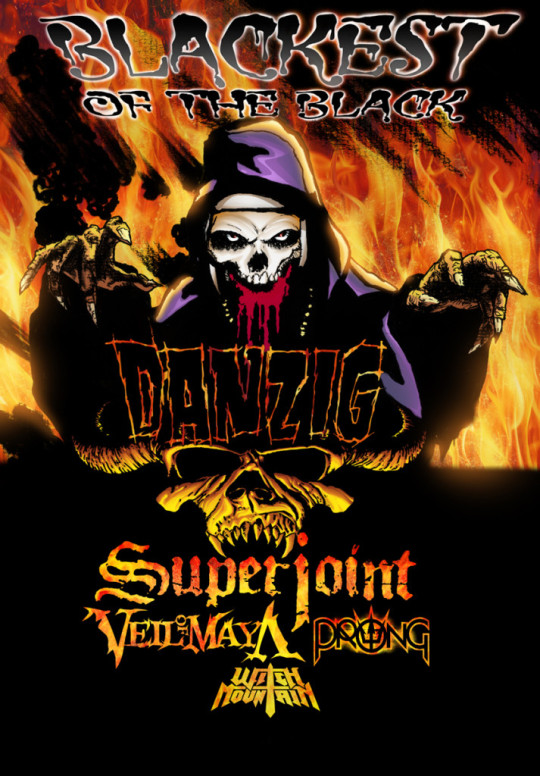
PL: Wrapping up here, what are you personally looking forward to the most on the upcoming tour with Danzig and Prong?
PA: I would say the camaraderie, man, and the audience. I would just say expect the unexpected and big props to Glenn for taking us out. I know his entire band...all those guys from years and years back, and it’s going to be awesome to see them again and hang out with them and work with them again. Our appreciation level for them taking us out is through the roof. Big props on Danzig’s side, and I’m really looking forward to the audience and the gigs, man. I think it’s gonna be a fucking blast, man. I think it’s going to be well worth the time anyone takes out of their busy and hectic schedule to come see this rock ‘n’ roll program. I think it’s going to be awesome.
0 notes